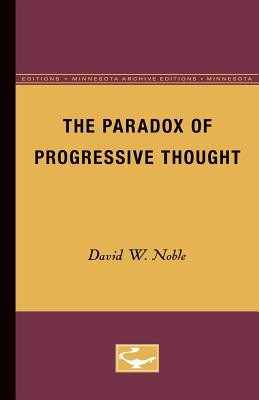
- We will send in 10–14 business days.
- Author: David W Noble
- Publisher: University of Minnesota Press
- ISBN-10: 0816658374
- ISBN-13: 9780816658374
- Format: 14 x 21.6 x 1.5 cm, minkšti viršeliai
- Language: English
- SAVE -10% with code: EXTRA
Reviews
Description
The Paradox of Progressive Thought was first published in 1958. Minnesota Archive Editions uses digital technology to make long-unavailable books once again accessible, and are published unaltered from the original University of Minnesota Press editions.
This book describes and analyzes an important aspect of American intellectual history, the climate of opinion in which nine leaders of progressive thought in America in the late nineteenth and early twentieth centuries were important creators and spokesmen. By closely examining the central ideas of these men, Professor Noble presents an illuminating view of a significant phase of the liberal tradition in America. At the same time, he questions many of the generally accepted views about the philosophical basis of traditional liberalism and demonstrates the paradox of progressive thought.
The social philosophers whose writings and teachings he scrutinizes are Herbert Croly, long-time editor of the New Republic; James Mark Baldwin, psychologist and philosopher; Charles H. Cooley, author of Social Organization; F. H. Johnson, theologian whose name was linked with Darwinism; Henry Demarest Lloyd, reformer and newspaperman who attacked the evils of monopoly in his book Wealth and Commonwealth; Richard T. Ely, economist and early advocate of Christian socialism; Simon N. Patten, whose work The Premises of Political Economy lifted him to fame; Thorstein Veblen, whose Theory of the Leisure Class is a household word today; and Walter Rauschenbusch, the Baptist clergyman who wrote Christianity and the Social Crisis and Christianity and the Social Order. In addition, there is extensive consideration of the thought and influence of Carl L. Becker, the noted historian and analyst of thought and philosophy in action.
EXTRA 10 % discount with code: EXTRA
The promotion ends in 21d.12:45:51
The discount code is valid when purchasing from 10 €. Discounts do not stack.
- Author: David W Noble
- Publisher: University of Minnesota Press
- ISBN-10: 0816658374
- ISBN-13: 9780816658374
- Format: 14 x 21.6 x 1.5 cm, minkšti viršeliai
- Language: English English
The Paradox of Progressive Thought was first published in 1958. Minnesota Archive Editions uses digital technology to make long-unavailable books once again accessible, and are published unaltered from the original University of Minnesota Press editions.
This book describes and analyzes an important aspect of American intellectual history, the climate of opinion in which nine leaders of progressive thought in America in the late nineteenth and early twentieth centuries were important creators and spokesmen. By closely examining the central ideas of these men, Professor Noble presents an illuminating view of a significant phase of the liberal tradition in America. At the same time, he questions many of the generally accepted views about the philosophical basis of traditional liberalism and demonstrates the paradox of progressive thought.
The social philosophers whose writings and teachings he scrutinizes are Herbert Croly, long-time editor of the New Republic; James Mark Baldwin, psychologist and philosopher; Charles H. Cooley, author of Social Organization; F. H. Johnson, theologian whose name was linked with Darwinism; Henry Demarest Lloyd, reformer and newspaperman who attacked the evils of monopoly in his book Wealth and Commonwealth; Richard T. Ely, economist and early advocate of Christian socialism; Simon N. Patten, whose work The Premises of Political Economy lifted him to fame; Thorstein Veblen, whose Theory of the Leisure Class is a household word today; and Walter Rauschenbusch, the Baptist clergyman who wrote Christianity and the Social Crisis and Christianity and the Social Order. In addition, there is extensive consideration of the thought and influence of Carl L. Becker, the noted historian and analyst of thought and philosophy in action.


Reviews